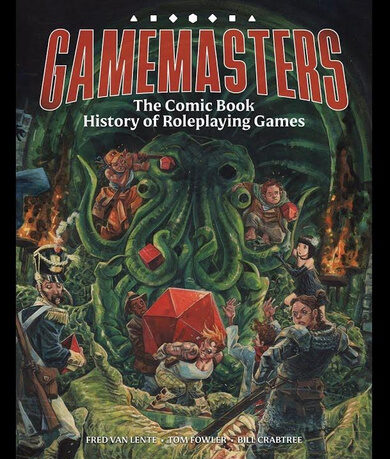We may earn money or products from the companies mentioned in this post.
Since people seemed to like last week’s blog about writing adventures for publication (and since I’m still trying to figure out the best way to approach the more in-depth discussion of Cinemechanix), I’m going to follow up with a blog about actually submitting the game. I haven’t actually done very much submitting (nearly everything I write is self-published or written for a specific project that someone I know is publishing), but I have been on the receiving end of a lot of submissions. Therefore, this post won’t be so much “ways to make a game company notice your submission” as “ways to avoid getting your submission dismissed immediately.”
Don’t Send Unsolicited Manuscripts
There may be a few companies who accept complete manuscripts from any random person on the internet, but most just want a proposal at first. In fact, most submission guidelines specifically state that unsolicited manuscripts will not be read. The main reason is to protect the company from charges of IP theft. I know that you think your game is a beautiful snowflake, but all snowflakes look pretty much alike unless you look at them really closely. If we’re working on a game about Ninja Space Sharks, we don’t want to see your complete manuscript about Ninja Space Sharks because if we do you’re going to see any similarity between the two as evidence that we stole your idea. If we only saw a 400-word proposal and responded with “sorry, but we’re already working on a game about Ninja Space Sharks,” you’re more likely to realize that most of the similarities between our finished product and your rough draft exist because there are just certain things that you’ve got to have in a game about Ninja Space Sharks.
Don’t Send Form Letters
In my experience most form letters are from people who are looking for freelance work rather than from people with a game they want to publish (here at One Hex Tower, a surprisingly high percentage seem to be from South American artists), but we’ve gotten a couple of “I’ve got a game I’d like to publish” emails that were obviously form letters. Hex doesn’t usually hire freelance writers, so “I’m looking for writing work” form letters go into File 13 (we respond with our own form letter and keep the information around in case we ever get desperate, but the folder they’re in rarely gets opened). For artists, Leighton keeps a short list of people who we’d like to work with if a project comes along that fits their style. Artists who send form letters rarely (actually “never” might be more accurate) end up on that list; they go into File 13, too. The handful of game submission form letters we’ve gotten have also gone to File 13, but usually more because we weren’t interested in the ideas (see next section) than because they were form letters. Other companies who use more work for hire are probably less annoyed by form letters than we are, but including a few sentences that make it clear that you know who the letter is going to and have some idea what kinds of games they produce will probably give you a better chance of standing out from all the form letters.
Read The Submission Guidelines
Most companies that accept submissions have a set of submission guidelines on their web site, and you should read them before you send anything. In addition to telling you what the company wants from you, they can often save you time by telling you what the company doesn’t want. For example, the Hex Writers’ Guidelines (which are on the same menu as the link to the contact form most freelancers use, but still obviously don’t get read by most people who contact us) clearly say that we’re not looking for new game systems or traditional fantasy games. If you submit a proposal related to either of those without preceding it with “I know you aren’t looking for new game systems or traditional fantasy, but,” we’re going to stop reading as soon as we hit the part that makes it clear you haven’t read the guidelines. If you can’t be bothered to read the submission guidelines, it’s a warning sign that you might be difficult to work with. Either you’re lazy, you can’t follow simple instructions, or you’re arrogant enough to think the rules don’t apply to you because your idea is so brilliant (statistically speaking, it’s not).
Even if your revolutionary encumbrance system is so great that any company would be foolish not to publish it, ignoring the guidelines can keep it from ever being seen. If your submission includes everything the company asks for in its guidelines, whoever receives it can put it directly into the workflow for new submissions. If it’s missing something (or in some cases, if it includes stuff the company doesn’t need or want), you create more work for the person who receives the submission. Every new step they have to take to move your submission along is a new chance for them to decide it’s not worth the hassle.
Be Professional
Your submission letter doesn’t necessarily need to be formal and follow the format for a business letter that you learned in English class, but an email that says “doodz, gotta kickass idea 4 a game about ninnnja space sharks what u pay me 4 it” isn’t going to cut it. A half-assed proposal is a warning sign that the work will be equally half-assed, and there’s a limit to the amount of editing and revision a company can justify putting into a game to make it publishable no matter how great the premise. Don’t give the publisher reason to believe your submission isn’t going to be worth the effort.
Also, since most freelancers don’t work at the company offices, the bulk of the revision, editing, and other work required to get the book ready is going to happen through email (or some other form of written communication). Don’t give a company reason to think they’re going to need a decoder ring to decipher every email you send. Think of your submission letter as a job interview and try to look smarter and more competent than you actually are.
Expect To Make Revisions
I know you think that everything you type is pure brilliance, but you need to understand that if your submission gets accepted, there’s still a lot of work left to do. Some of it’s just basic copy editing, but usually you’re going to have to make some changes to your manuscript. Keep in mind that the company has (probably) published more games than you have, so most revision requests exist for some reason beyond just making your life miserable. You don’t necessarily have to accept every suggestion your editor makes without question, but you should choose your battles. If you don’t understand why your editor is asking you to do something, ask them. If you think a suggestion makes the game worse, explain how. If you fight the editor over every single change (especially relatively meaningless ones), your first project with the company will probably be your last, and even that first one might get cancelled if you’re a gigantic pain in the ass to work with.
Finally, never try to create a game that can be described as “like D&D, but better.” It won’t be to the people who play D&D, and those of us who don’t play D&D don’t give a shit. If you’ve got a game about Ninja Space Sharks, though, the Hex Writers’ Guidelines are right here.
Do you enjoy this blog so much you feel guilty not paying for it? You can fix that by supporting me on Patreon!






